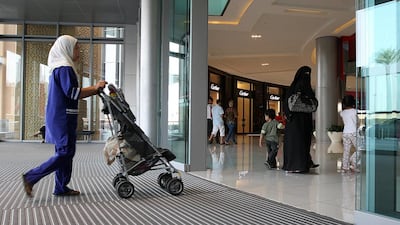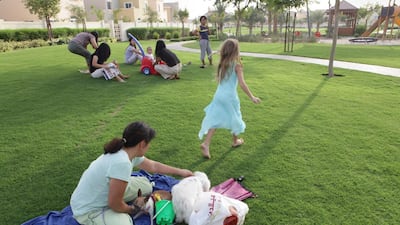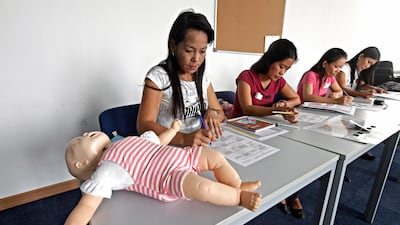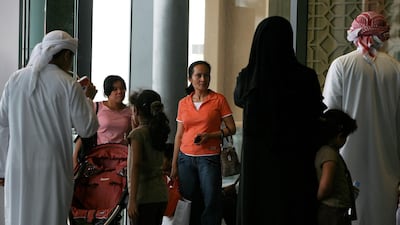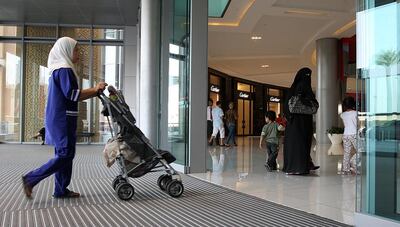A new agreement between the UAE government and the Philippines aims to protect Filipino domestic workers and their right to a fair wage and suitable working conditions.
Labour ministries of both countries will resume hiring household workers from the Philippines from April 1. Legal recruitment of maids from the Philippines stopped in 2014, when the country barred its citizens from taking on jobs as domestic workers in the UAE as a result of cases of negligence.
Despite the ban, Filipinos continued to enter the Emirates on visit visas and later converted these into domestic worker permits.
This put pressure on overseas missions and social welfare groups that dealt with cases of runaway maids, who fled employment because of mistreatment.
More than one million Filipinos live in the UAE, of which 20 per cent are household service workers.
The National spoke to Barney Almazar, a director at legal practice Gulf Law, to break down why the new deal was important and the changes that will follow.
“If you are working in an office or department store, you can ask for help. But if you are a domestic worker, you are vulnerable. If you are mistreated, you can be locked in and you may not be able to get out,” Mr Almazar said.
Before the coronavirus pandemic, he handled two to three cases a month of domestic workers requesting assistance.
These did not always involve maids in distress. They included cases of workers trying to move to a new employer or women whose visas had expired because their employer failed to renew their residency documents.
"This is a special sector where protection is very important," Mr Almazar said.
“A balance has been struck with this move to allow Filipinos back into the UAE as domestic help, because there are a lot of Filipinos in need of work.”
Wage protection and secure living conditions
Domestic workers will be guaranteed eight hours of rest, a paid day off every week and a month’s paid annual leave.
Employers cannot take the worker's passport and ID; these documents must remain in the employee's possession.
Domestic staff must also have access to a personal mobile phone.
The employment contract will be examined and monthly wages specified by an assigned authority in the Philippines before the worker leaves the country.
The new unified employment contract will contain strict rules to protect workers. The employer and recruitment agencies – overseas and Filipino – will be liable if a worker is exploited.
What has changed?
Since 2014, Filipinos who converted UAE visit visas to domestic worker permits were left vulnerable. They were often promised office jobs by recruitment agencies, but instead were coerced into accepting a maid’s visa with low wages.
Some, forced to work inhumane hours, escaped from their employer’s home and sought assistance from the police, consulate or embassy.
The new agreement guarantees that officials can track the employer and ensure accountability of both the employer and agency.
All household workers will pass through accredited channels and both governments will see the contract.
If a higher salary was promised and not given, authorities can hold both the agency and employer liable.

Contents of household service worker agreement
The employer will need to sign a document with 14 points that must be met. One of them is to ensure the domestic worker calls the Philippine embassy to confirm their arrival in the UAE.
The form also includes the employer’s residential address.
According to an employment agreement for the UAE posted by the Philippines government, the worker "shall be treated humanely by the other persons staying at my house".
The maid will also be provided with a room to sleep in and be allowed to rest for at least eight consecutive hours each day. They will also work only in the employer's residence stated
in the agreement.
The Philippine embassy will be allowed to communicate with the worker by phone when requested and the employee and employer must report to embassy officials in person when required.
The contract will not be extended or transferred to another employer without verification and approval of the Philippine embassy.
The Philippine Overseas Labour Office will be notified of “any significant development” in employment and repatriation.
And the employer will help the employee to gain any benefits provided under UAE laws.
Minimum wage
A Filipina domestic helper must be paid at least $400 a month for an overseas contract to be processed, per Philippine regulations. Details of an updated wage structure are expected to follow.
Penalties
In case of any complaints or a case filed by the maid, the employer and recruitment agency based in the Emirates will be governed by UAE law.
If a maid is not able to recover their dues in the UAE, the new agreement specifies that they can claim this from the agency in the Philippines when they return home.
All recruitment agencies in the Philippines must place a deposit and sign guarantees that the deposit will be forfeited to compensate a worker in the event their rights are breached.
Why were Filipino domestic workers temporarily banned?
The Philippines stopped allowing Filipinos to work as household staff in the UAE more than six years ago. The government said it wanted to ensure workers were protected after cases of ill treatment, maids not being allowed mobile phones and their passports being confiscated by employers and unscrupulous agents.
What changes for Filipino maids already in the UAE?
The 200,000 Filipino household workers in the UAE can continue to renew their work visas or cancel their employment contracts as before.
They can approach the consulate, embassy or legal aid centres designated by the missions if they need any assistance.
Workers at risk
Starting on April 1, newly hired household staff from the Philippines will be shielded with stronger safeguards, while people who enter the UAE on visit visas aiming to switch to work permits place themselves at risk.
